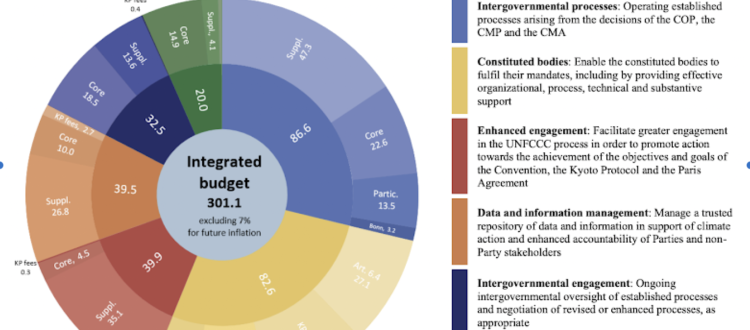BONN, A MATTER OF BUDGET
The mid-year intermediate negotiations have always represented the key moment in which the Countries establish, mostly after long negotiations preceding the meetings in Bonn and without formalities and TV cameras, how much should be budgeted for the following two years in support of the UNFCCC Secretariat.
In fact, the Secretariat – which organizes the COPs, convenes the meetings, and actually manages everything related to the climate negotiations throughout the year – bases its activity on a biennial forecast budget approved by the UN Countries during the intermediate meeting preceding the first of the two-year period concerned: today, June 2023, is being discussed the budget for 2024-2025.
This discussion is only apparently technical. In fact, through their decisions on financial allocations, Countries indicate to the world the issues and priorities on which they want to work on in the following two years, except for epochal political upheavals – and we know that after COP27 we can really expect anything, in such a rapidly changing geopolitical framework.
In Bonn, world negotiators are currently discussing a budget scheme proposed by the UNFCCC Secretariat for 2024-2025 which could see the Secretariat’s financial resources grow up to €301.1 million, not including an expected increase due to inflation of + 7% and therefore extendable up to €322.2 million. It might seem like a lot, for a small organization after all – built to manage a now gigantic, global process – but it is important to read the numbers carefully.
First of all, we are talking about a two-year budget which means the countries are called to decide on a budget that will support two years of activity. Basically, you divide the total by two. Excluding the expected increases linked to the inflation’s trajectories, we can therefore say that the scheme under examination in Bonn foresees an average annual spending capacity of around €150.55 million, in any case an increase compared to the overall integrated budget for 2022 which was settled at €125.8 million. However, we must take into account the fact that the two-year period 2022-2023 was still marked, even if partially, by the effects of the pandemic. This is important if we think that the UNFCCC budget is also used, among other things, to organize in-person workshops with experts, to buy plane tickets, to book hotels. Reduced movement capacities on a global scale between 2020 and 2022 have inevitably and significantly reduced spending.
Speaking of an “integrated” budget, another non-trivial element rises. In the construction of each two-year forecast, the countries indicate how much to allocate in terms of “core” resources, i.e. for essential activities and how much, instead, for “integrated” activities. Breaking down the budget proposal for the two-year period 2024-2025, we see that the minimum budget requested by the Secretariat, i.e. the minimum operating threshold pre-agreed by the countries in the preparatory meetings for the actual negotiation, stands at €82.6 million over the two-year period, approximately €41.3 million per year, equivalent approximately to the current spending budget of the Municipality of Martina Franca, in the province of Taranto, or of any Italian municipality of more or less 40,000 inhabitants that you can think of.
This comparison helps understanding how an organizational, technical and often scientific support machine for Countries actually benefits from very little autonomy, compared to the nearly 200 Governments that make up the United Nations. As mentioned, we are talking about Countries which influence each year, through the budget, the work priorities for the following two years. In the two-year period 2022-2023 great importance was given to the issue of transparency, which represented 20.6% of expenditure on the different programs, with identical figures proposed again for the new forecast proposal (at least regarding the core budget, with a very slight drop on the integrated one). On the other hand, the issue of loss and damage is completely absent: in order to see it integrated among the “pillars” of the mission of the UNFCCC budget (mitigation, adaptation, implementation and transparency), a decision in this direction by the negotiators would be needed, most likely in an upcoming COP. The resources dedicated to workshops, conventions and meetings on the now very central topic of compensation for loss and damage therefore remain ascribed to the budget, at least for now, under adaptation expenses. Finally, it’s worth mentioning that in the proposal presented by the Secretariat to the negotiators, human resources spending slightly increase, although in this case, as above, it would be more appropriate to compare the proposal on today’s table with the latest pre-pandemic budget.
We will continue monitoring the outcome of the negotiations, which have just begun, on the next UNFCCC budget in the two upcoming weeks of intermediate negotiations.
Article by Jacopo Bencini, Policy Advisor and UNFCCC Contact Point

